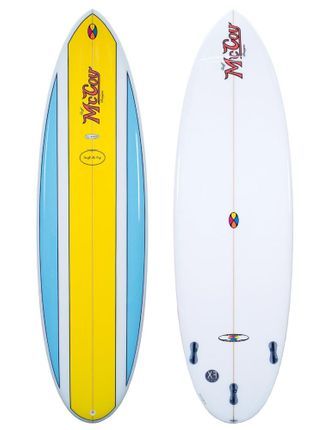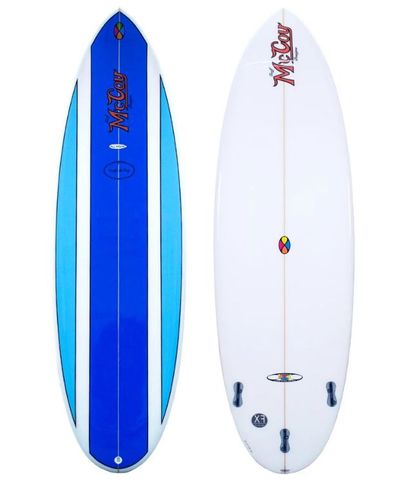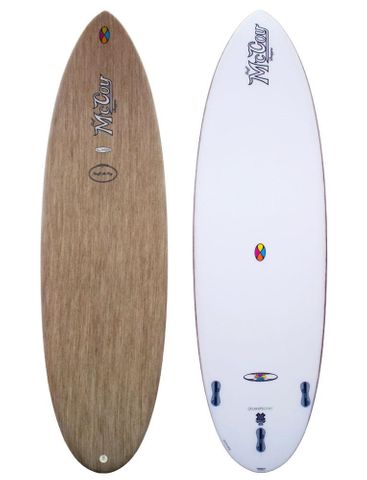McCoy
-
MCCOY
“This design is the first Nugget I shaped in 1994.
Proven to be a very versatile performer in a wide range of wave conditions from 1′ ~ 8′ all around the surfing world; thicker wider and shorter with more volume and buoyancy than you have had before, easy to paddle and catch waves, easy to control, with more speed than you have had in years! When it starts to barrel, you will be laughing.” Geoff McCoy
Biaxial Fibre Glass has about half of its fibres aligned along the length of the cloth (0 degrees) and about half across the cloth (90 degrees) lending itself as a perfect option for creating a controlled flex pattern.Expanded Polystyrene (EPS) foam is a version of polystyrene foam typically found in the core of Firewire surfboards. EPS is typically the lightest of the three foams used in surfboard construction resulting in a much lighter board translating to increased buoyancy and floatation. Basically the lowest density or lightest board will float you the best! The advantage of better buoyancy is added paddling speed and increased manoeuvrability allowing you to ride a smaller board. EPS foam core is also less likely to deteriorate over time!
Epoxy Resin is a healthier alternative to polyester as epoxy emits 50-75% fewer VOCs (volatile organic compounds) than polyester resin, which means a decrease in harmful chemicals in the shop and the environment in general. In fact, epoxy is a common household item, safe to use without a mask and with only moderate ventilation. Epoxy is lighter than polyester. Under most circumstances, resin makes up a large part of a completed board’s overall weight. Not only is epoxy lighter than polyester, but less is needed per coat. This ends up meaning a lighter surfboard – a big plus for most surfers. The biggest bonus However is the durability and strength of epoxy resin.
All XF boards are constructed using a 36gram EPS core with a high-grade timber stringer, each board is hand laminated using epoxy resign and biaxial fibreglass on the deck providing a lighter, stronger board that feels fast and responsive under your feet increasing performance in a wide variety of conditions!
LENGTH WIDTH THICKNESS VOLUME 5’6 20 2 5/8 34 5’8 19 3/4 2 5/8 35 5’11 20 1/4 2 5/8 37 6’1 20 3/4 2 3/4 41 6’3 21 2 3/4 43 6’6 21 1/4 2 7/8 47 6’8 21 1/4 2 7/8 49 6’10 21 1/2 2 7/8 51 7’0 21 1/2 3 55 7’2 21 1/2 3 56 7’4 21 3/4 3 1/8 61 7’6 21 3/4 3 1/8 63 7’9 21 3/4 3 1/8 65 8’0 22 3 1/8 68 $1,145.00 -
MCCOY
“This design is the first Nugget I shaped in 1994.
Proven to be a very versatile performer in a wide range of wave conditions from 1′ ~ 8′ all around the surfing world; thicker wider and shorter with more volume and buoyancy than you have had before, easy to paddle and catch waves, easy to control, with more speed than you have had in years! When it starts to barrel, you will be laughing.”Geoff McCoy
Biaxial Fibre Glass has about half of its fibers aligned along the length of the cloth (0 degrees) and about halfway across the cloth (90 degrees) lending itself as a perfect option for creating a controlled flex pattern.Expanded Polystyrene (EPS) foam is a version of polystyrene foam typically found in the core of Firewire surfboards. EPS is typically the lightest of the three foams used in surfboard construction resulting in a much lighter board translating to increased buoyancy and floatation. Basically the lowest density or lightest board will float you the best! The advantage of better buoyancy is added paddling speed and increased maneuverability allowing you to ride a smaller board. EPS foam core is also less likely to deteriorate over time!
Epoxy Resin is a healthier alternative to polyester as epoxy emits 50-75% fewer VOCs (volatile organic compounds) than polyester resin, which means a decrease in harmful chemicals in the shop and the environment in general. In fact, epoxy is a common household item, safe to use without a mask and with only moderate ventilation. Epoxy is lighter than polyester. Under most circumstances, resin makes up a large part of a completed board’s overall weight. Not only is epoxy lighter than polyester, but less is needed per coat. This ends up meaning a lighter surfboard – a big plus for most surfers. The biggest bonus However is the durability and strength of epoxy resin.
All XF boards are constructed using a 36gram EPS core with a high-grade timber stringer, each board is hand laminated using epoxy resign and biaxial fiberglass on the deck providing a lighter, stronger board that feels fast and responsive under your feet increasing performance in a wide variety of conditions!
LENGTH WIDTH THICKNESS VOLUME 5’6 20 2 5/8 34 5’8 19 3/4 2 5/8 35 5’11 20 1/4 2 5/8 37 6’1 20 3/4 2 3/4 41 6’3 21 2 3/4 43 6’6 21 1/4 2 7/8 47 6’8 21 1/4 2 7/8 49 6’10 21 1/2 2 7/8 51 7’0 21 1/2 3 55 7’2 21 1/2 3 56 7’4 21 3/4 3 1/8 61 7’6 21 3/4 3 1/8 63 7’9 21 3/4 3 1/8 65 8’0 22 3 1/8 68 $1,325.00 -
This design is the first Nugget, Geoff McCoy shaped in 1994. Proven to be a very versatile performer in a wide range of wave conditions from 1ft to 8ft all around the surfing world; thicker wider and shorter with more volume and buoyancy than you have had before, easy to paddle and catch waves, easy to control, with more speed than you have had in years! When it starts to barrel, you will be laughing.”
Geoff McCoyFlax fibre cloth is an engineered reinforcement fabric made from the bast of the flax seed plant. While flax fibre is one of the oldest cultivated fibres for textiles, it is only recently that its use as a fibreglass substitute has been acheived. Incorporating flax fibre cloth in the lamination reduces the use of regular glass by 1/3rd and adds a great earthy look and more importantly helps lower our carbon footprint.
SR GreenPoxy 56 is an epoxy resin which has up to 56% of its molecular structure coming from plant origin. This percentage is function of the carbon origin contained in the epoxy molecule. The final rate of the mix bio-based carbon content will depend on the hardener choice.
The manufacture of EPS foam does not involve the use of toxic isocyantes used in the production of regular surfboard blanks. Expanded Polystyrene (EPS) foam is light weight and has fantastic shock absorbing properties, making it ideal for surfboards. EPS foam has more buoyancy and flotation increasing paddling speed and maneuverability.
The Surfboard Agency has teamed up with the first, independent 3rd party consumer-facing “eco-label” for boards, the ECOBOARD Project is focused on reducing carbon footprints, increasing the use (and reuse) of renewable, recycled and up-cycled inputs, and reducing toxicity within the surfboard manufacturing process.
*No Fins Included - Recommended Fin: FCS II Accelerator
$1,195.00




